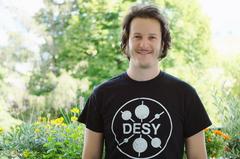URL: https://www.desy.de/news/news_search/index_eng.html
Breadcrumb Navigation
DESY News: PhD student from DESY and Universität Hamburg wins CMS Thesis Award
News
News from the DESY research centre
PhD student from DESY and Universität Hamburg wins CMS Thesis Award
Former DESY researcher Matteo Defranchis is one of three winners of this year's CMS Thesis Awards. With this award, the international research collaboration that operates the CMS detector at CERN in Geneva honours the best doctoral theses of the past year.

Matteo Defranchis. Image: private
Defranchis is from Milan and studied physics at the University of Milan-Bicocca. He joined the CMS collaboration in 2015, went to Fermilab in Chicago in 2016 for his master's thesis, and then joined DESY as a PhD student. Here, he worked on the PIER-funded project "The world's first measurement of the top quark mass running" by DESY and the University of Hamburg. He completed his PhD at the University of Hamburg in 2020 and is now working as a Research Fellow at CERN in Geneva.
" During my PhD I learned not only to perform physics research in a creative and independent fashion, but also to work in a diverse community of more than 3000 scientists, with different educational and cultural backgrounds. I also had the occasion to start developing leadership skills by coordinating small groups of scientists within the CMS experiment. The experience that I gained during my PhD extends far beyond physics understanding and technical skills. It made me a more mature, aware, and open-minded person," says Defranchis.
Every year for more than 20 years, the CMS Collaboration has recognised outstanding research by CMS doctoral students. Any dissertation written on a CMS-related topic is eligible for nomination - which means a diverse bouquet of physics analysis, simulation, computing, detector development and engineering. Dissertations are judged on clarity of presentation, originality and impact of the research.



